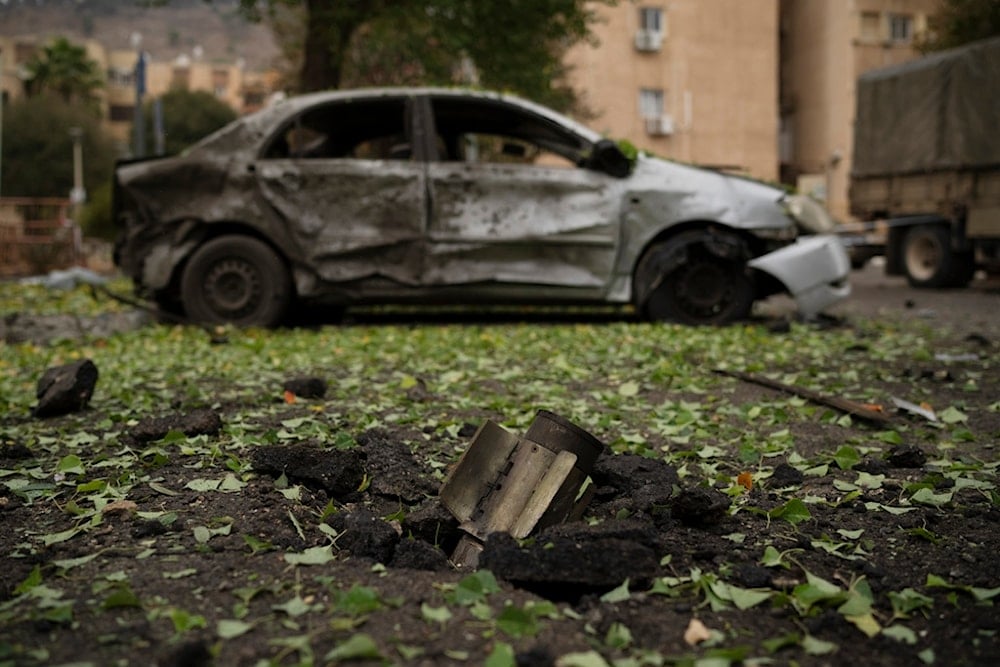Northern Israeli settlers frustrated over Lebanon ceasefire
Northern Israeli settlers are infuriated with their government over the ceasefire deal with Lebanon as they believe Hezbollah maintains an edge.
-

A rocket, fired from Lebanon during the night hours before the start of the ceasefire, sits wedged in the ground next to a damaged car in Kiryat Shmona, northern-occupied Palestine, on November 27, 2024. (AP)
As residents in South Lebanon return to their homes following the implementation of the ceasefire agreement between Lebanon and the Israeli occupation, Israeli media reports highlight growing fear and frustration among settlers in northern border settlements. These sentiments are fueled by what they describe as a sense of abandonment by the Israeli government, which has been echoed repeatedly throughout the war.
Israeli Channel 12 reported a "deep mistrust" between northern settlers and the Israeli occupation forces, noting that "no one has addressed the reality in the north for over a year." The network quoted a resident of Metulla, a northern border settlement, who said, "Being neighbors with Lebanon, the Israeli military must do much more to restore our sense of security."
Despite government calls for settlers to return, many express doubts, with Channel 12 adding that "there is no place to return to." The displacement has also disrupted daily life, including education, as families struggle to resume normal routines.
Strategic advisor Eyalet Frisch criticized the mass evacuation of roughly 100,000 northern settlers during the war, describing it as a "strategic mistake" driven by "hysteria over Hezbollah." Former Israeli military spokesperson Avi Benayahu echoed this view, stating that the military was in a state of panic after evacuating from the north.
'1-0 in favor of Hezbollah'
Channel 14 warned that if the government continues its current approach, the north risks becoming a "Lebanon border envelope" similar to the precarious situation faced by communities near Gaza.
Moshe Davidovich, head of the so-called "Frontline Settlements Forum," labeled the day of the agreement as "a sad day for northern settlers," claiming it failed to provide a safe return. He dismissed the deal as "not a victory," describing it as "1-0 in favor of Hezbollah."
Former Israeli military spokesperson Ronen Manelis further contradicted government claims that Hezbollah had been pushed back 15 kilometers from the border, calling such assertions "utter nonsense."
Meanwhile, US Special Envoy Amos Hochstein defended the recently brokered ceasefire between the Israeli occupation and Hezbollah, dismissing claims that the former could have secured a more favorable deal, including maintaining a buffer zone inside Lebanon.
Hochstein rejected the criticism voiced by former Israeli Prime Minister Naftali Bennett, who argued that the lack of a buffer zone in the agreement would allow Hezbollah to rebuild positions near the border, potentially staging future attacks.
“Yes, there are fantasy deals where you get a ceasefire agreement with a security zone, but those won’t ever happen,” Hochstein told Israeli Channel 12.
Throwing blame on the US
Netanyahu's aides reportedly briefed journalists to build public support for the ceasefire by portraying it as an unavoidable decision imposed by the US. Analysts suggest this narrative is intended to counter criticism from the Israeli occupation's right-wing factions, which oppose any concessions to Hezbollah and Lebanon.
US officials countered this claim, emphasizing that Netanyahu was a willing partner in the negotiations. "The idea of US threats is a fabrication to appease domestic critics," said a senior Biden administration official.

 4 Min Read
4 Min Read








